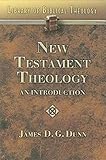New Testament theology : an introduction / James D.G. Dunn.
Material type: TextSeries: Library of biblical theologyDescription: ix, 232 pages ; 23 cmISBN:
TextSeries: Library of biblical theologyDescription: ix, 232 pages ; 23 cmISBN: - 9780687341207
- 0687341205
- ARCH YNDC 230.04 D923N 22
- BS2397 .D835 2009
| Item type | Current library | Collection | Call number | Status | Date due | Barcode | |
|---|---|---|---|---|---|---|---|
 Archives
Archives
|
SAIACS Archives Room | Yandell Collection | ARCH YNDC 230.04 D923N (Browse shelf(Opens below)) | Not for loan | 064698 |
Includes bibliographical references (pages 161-164) and index.
Introduction -- What is New Testament Theology? -- Which "Bible"? Whose Bible? -- Question of the Canon -- Theology or Theologies? -- Theology or Theologizing? -- Paul, the NT Theologian Par Excellence -- Determining Factors --- NT Theology and the OT -- Revelation of Jesus Christ -- Experience of the Spirit -- Central Subject Matter of a Biblical Theology of the NT -- Theology of God -- Inherited Theo-logy -- Making Sense of Jesus (Christology) in Relation to Theo-logy -- Theology of Salvation -- Inherited Theology -- NT Theology of Salvation -- Church of God -- Inherited Theology -- Israel Redefined? -- Ethical Outworkings -- Inherited Theology -- Law and the NT -- Conclusion Main Findings -- Theology as Theologizing.
In this third volume in he Library of Biblical Theology series, James D.G. Dunn ranges widely across the literature of the New Testament to describe the essential elements of the early church's belief and practice. Eschatology, grace, law and gospel, discipleship, Israel and the church, faith and works, and most especially incarnation, atonement, and resurrection; Dunn places these and other themes in conversation with the contemporary church's work of understanding its faith and life in relation to God's self-revelation in Jesus Christ. The purpose of the Library of Biblical Theology is to bring the worlds of biblical scholarship and constructive theology together. It will do so by reviving biblical theology as a discipline that describes the faith of the biblical periods on he one hand articulates normative understandings of modern faith and practice. Thus, volumes in the series ill move from a description of God or an element relating to God as it is found in the biblical text, to making a theological judgement based on one's own contemporary worldview, forged within a community of faith--from back cover.
There are no comments on this title.

